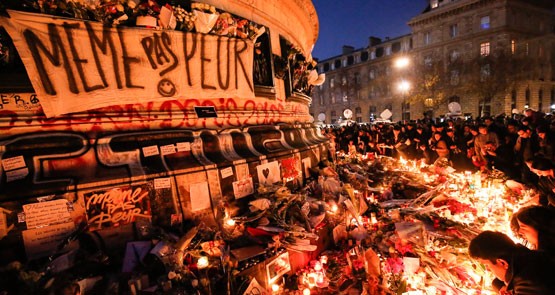
Despite the rush of hot takes, instant analyses and reflexive media speculation in the aftermath of the mass murders in Paris, we don’t know a lot about the perpetrators, their rationale or who was behind them, if anyone. The much-discussed Syrian passport found on the body of one of the murderers — instantly becoming the basis for for an attempt to link Syrian refugees to the attack — was queried by US officials almost immediately and now appears to have been confirmed as fake by French officials. A witness at the Bataclan concert hall said that one of the murderers shouted “What are you doing in Syria? You’re going to pay now,” in an apparent reference to France’s role in bombing Syria. The murderers identified so far are French and Belgian nationals. Islamic State has claimed responsibility, and one of the identified killers is thought to have fought for Islamic State in Syria. But the extent to which the attacks were directly planned and controlled by Islamic State — which in recent days has suffered two military defeats in Iraq and Syria — isn’t clear. Much media coverage suggests this was a plot hatched in Raqqa, but there’s no clear evidence one way or the other for that claim versus a more self-directed plot by IS supporters.
What we do know about Islamic State is that it is desperate for more foreign military forces to be dispatched to Iraq and Syria — particularly ground troops — and to provoke brutality and demonisation in Western countries toward Muslim citizens. More foreign military intervention in the Middle East will feed Islamic State’s narrative that Sunni Islam is besieged by the rest of the world — “what are you doing in Syria?” — and must be defended at all costs (remember, it was Bashar al-Assad who turned pro-democracy demonstrations against him in Syria into a bitter sectarian conflict by targeting Sunni Syrians with his air force, artillery and death squads).
Not merely would further foreign intervention stoke terrorist attacks in Western countries (and, now, Russia and Lebanon and, perhaps, Iran), but it would encourage new waves of foreign fighters to join its ranks in Syria, where they are being depleted by bombing — although not quickly enough to make a substantial military difference.
It will also encourage further financial support from the sources of external funding that have been so important to IS — from wealthy donors in countries like Kuwait, Qatar and Saudi Arabia, the latter a country with social and legal mores barely indistinguishable from those of IS.
Moreover, even the defeat of IS by foreign military forces would help the narrative of radical Islamists more widely. IS knows this better than anyone: it is the product of the US-led attack on Iraq in 2003 and the subsequent occupation, as even Tony Blair has been forced to acknowledge. Many in the ranks of IS’ military forces are Saddam-era Iraqi soldiers forced out by the US in its disastrous occupation. Another invasion, another occupation, yet more evidence that Islam is under attack.
And provoking a backlash against Western Muslims is an explicit goal of IS, which has referred to the need to destroy the “grey zone” in which Western Muslims live, between the “good” of extremist Islam (as interpreted by IS) and the “evil” of anyone who doesn’t obey IS.
In this context, the febrile reaction of Islamophobes to Friday night’s massacres is exactly what IS wants, whether it directly controlled the attacks or not. When the Nine Network, for example, gives a television and social media platform to Pauline Hanson to exploit the dead in Paris to push her own agenda, it is working enthusiastically the fulfil the goals of IS and the murderers themselves.
What the attacks might do is undermine the convenient fiction that Western politicians have relied on for so long, that Islamist terrorism is motivated by a nebulous medieval loathing for all modernity and, in particular, our “Western freedoms” (which Western governments are working so hard to extinguish in the name of fighting IS). IS and those who identify with it certainly possess a mediaeval mindset, but their behaviour is based on a rational calculation of how to achieve their goals, and how to respond to the foreign policies of both Western and other countries that intervene in the Middle East. Decontextualising the attacks by ignoring the role of Western foreign policy not merely dishonours the victims, it too serves the interests of these butchers.








“The much-discussed Syrian passport found on the body of one of the murderers ”
That rather reminds me that the alleged terrorists in Charlie Hebdo did the same – leaving an ID in a car.
Are we learning by experience?
As this mob of deluded murderers do not represent Islam nor constitute a state, isn’t it time to come up with an acronym or a term which includes neither word while at the same time being appropriately derogatory and contemptuous? Even if it were only used within Crikey, it’s the least that these bastards deserve.
A good article, Bernard
Bernard and fervent acolytes, even you should be able to comprehend that fundamentalist terrorists don’t need direct control?
Just look at your own quaint fundamentalist Tooth Fairy Brigade type contributions.
And let us not forget the pristine passport of one of the high-jackers found in the smouldering ruins of the twin towers post 9/11. As someone suggested elsewhere, tanks should be made out of passports as they are so immune to destruction.